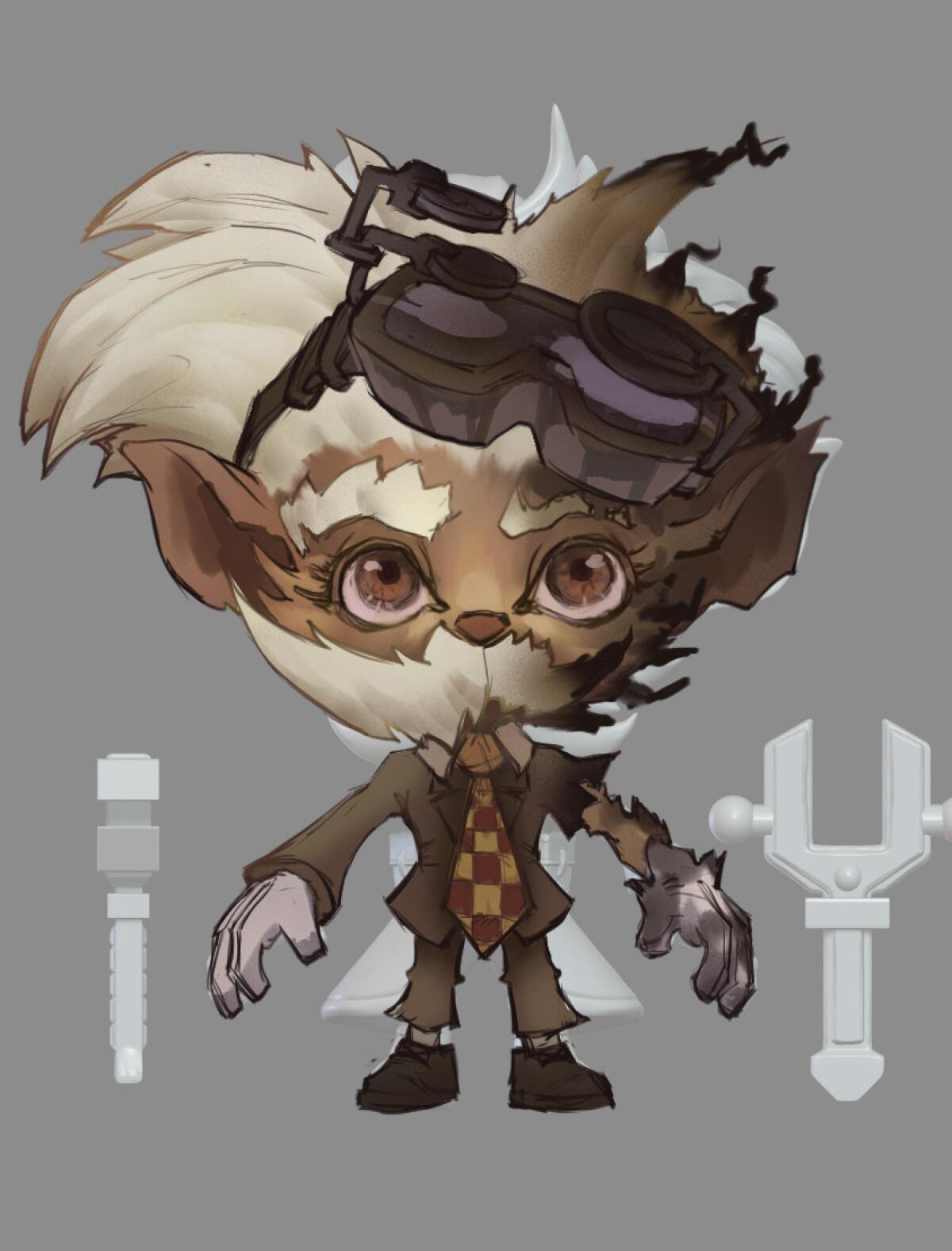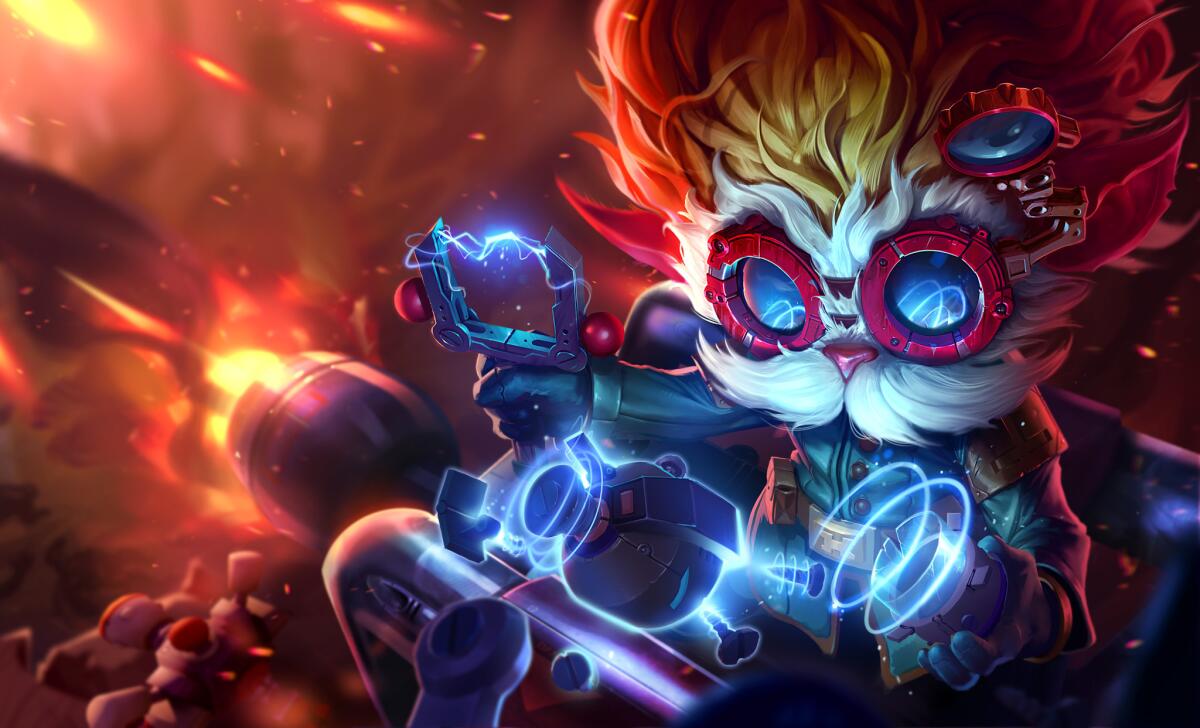Riot Games has one title: ‘League of Legends.’ A decade in, there’s still no rush to release another
- Share via
More than 100 million people play “League of Legends” each month, making it the world's top PC game.
But the milestone, reached sometime in the last year and announced Tuesday, does little to settle questions about developer Riot Games’ growth pace and when it might finally launch a second game.
The Los Angeles company continues to scuttle ideas for a next act and is struggling to propagate an against-the-grain culture across a growing workforce. Credited for turning video games into an almost-mainstream sport in recent years through its hit “League of Legends,” Riot also is considering transforming its role at the center of e-sports — a position it has described as “awkward.”
Co-founders Brandon Beck and Marc Merrill must wrestle with these issues as they lead their company into another decade. As part of 10th anniversary celebrations this month, they spoke to the Los Angeles Times at their office, looking back and forward.
“‘League of Legends’ for so many people has become a shared language and passion and that to us is really motivating,” said Merrill, Riot’s president. “The next 10 years, we want to do more of the same, make other interesting games and continue to grow and invest in ‘League.’ ”
Merrill and Riot Chief Executive Beck refused to characterize the company’s increase to 103 million players last month from the previously released figure of 67 million nearly three years ago, saying it was up to others to judge whether that’s satisfactory growth.
They also declined to comment on sales and profits. Outside estimates have the company easily seeing $1 billion in revenue, mostly from selling cosmetic upgrades to virtual characters in “League of Legends.”
Now fully owned by the Chinese gaming giant Tencent, Riot has both the independence and financial flexibility to chart its own course. Riot wants to end up with “a few games” over the next decade, Beck said. But there’s no rush.

Regardless of what lies ahead, Riot will remembered for unusual strategies and for taking e-sports from “a cult segment to a huge stature,” said Lisa Cosmas Hanson, managing partner of gaming industry consultancy Niko Partners.
Financiers including NBA stars and media moguls are spending millions of dollars to field top-tier “League of Legends” teams and thrust them into tournaments with many more millions in prize and sponsor money at stake. How the competition grew so fierce — to the point that millions of fans stream professional “League” games each week — is a testament to Beck and Merrill deviating from industry norms, analysts and early Riot investors said.
Unlike big gaming companies that had to sell a new game every year, Riot launched “League of Legends” in 2009 as a free online download. Updates are free as well, with the company reliant on the in-game transactions for revenue. The setup enables players to go much deeper into a single virtual universe, as Merrill and Beck longed to do as gaming-obsessed teenagers.
The game lacks a single-player mode. And though the goal of destroying the enemy’s base is easy to follow, getting a grip on how to succeed is difficult. The decisions emphasized “League” as a community, where even just being a spectator was OK.
Rick Heitzmann, managing director at FirstMark Capital and early Riot investor, recalled how Merrill compared big gaming publishers to Disneyland. They could afford to develop a crazier roller coaster, or game, every year.
With much less cash, Riot had to be “pickup basketball or soccer, where it’s not about the field or court, it’s about the social interactions and competitiveness and community,” Heitzmann said.

Though the strategy worked, the laser focus on “League of Legends” has invited scrutiny about whether Riot left money on the table by not seizing on its popularity to market additional games.
“It’s very rare to see a company focus on one game for such a long time and not introduce any sequels, spinoffs or even brand-new” titles, Niko Partners analyst Daniel Ahmad said.
Beck said it comes down to valuing long-term potential over short-term gains and that development of “League of Legends” is far from done.
Teut Weidemann, a longtime gaming executive and consultant, said looking elsewhere too soon would have distracted Riot. But he noted that the company could be challenged if players shift attention to similar smartphone and virtual-reality games, two growing mediums where Riot hasn’t carved out a big spot. Already in China, Tencent’s “King of Glory” — regarded as a “League”-like mobile game — has hit 30 million daily users, according to Niko Partners.
A cautious approach to developing a new game gives Riot time and space to fit its core value — doing right by its players — into a larger ecosystem.
“We feel comfortable doing R&D on big, risky, crazy ideas and failing internally multiple times before shipping to players,” Beck said.
Players have stuck with the company through embarrassing growing pains, but releasing more games increases the chances of unsettling the strong relationship.
“Our intentions haven’t changed but the quality of execution has,” Merrill said of the player-first mentality, with Riot now at about 2,000 employees worldwide. “Often, our biggest mistakes are where we lose sight of … how players are perceiving things.”
Most recently, Merrill admitted that he forgot how many eyes are on his company when he wrote on an online forum to respond to criticism from a professional “League of Legends” team owner. The owner called for Riot to promote a more stable business climate in e-sports, in which owners, players and sponsors see the promise of huge profits. Fans lashed back at Merrill for being insensitive to the concerns.
Operating 13 tournaments for its game across the world has placed Riot in an “awkward” spot of having to balance the interests of multiple parties, Beck said.
“We wish we didn’t have to be in the middle of all that, and in the long term, we hope we won’t have to be,” Beck said.
Asked how the company could relinquish control, he said, “You tell me.”
The co-founders recognize that a fresh set of game-changing ideas is needed to take its sport another level up.
“One of my favorite quotes is from Bruce Lee,” Merrill said. “‘There are no limits, only plateaus,’ and we’ve hit this interesting plateau. What will get us to this next plateau? The solutions that got us here won’t necessarily be the ones that get us to the next one, and that’s the ground we’re going to explore.”
‘World of Warcraft’ designer launches start-up
The creative genius behind the hugely popular “World of Warcraft” computer game announced Monday that he has raised $25 million for his own Irvine company.
Rob Pardo, who left Irvine game-making giant Blizzard Entertainment two years ago after a well-regarded tenure, is calling his start-up Bonfire Studios. The goal is to create “epic games” with small teams, a formula at odds with how well-known game companies typically operate.
Investors include Riot Games and Silicon Valley venture capital firm Andreessen Horowitz.
E-Sports team owners form a league
Seven teams that compete in high-level tournaments for the shooting video game “Counter-Strike: Global Offensive” have formed a league that’s more like the NBA and less like the e-sports operations that popped up in recent years.
The Professional E-Sports Assn., which will split profits 50-50 between players and team owners, cuts out event organizers and tournament operators. Owners say things will be better for themselves and for players if they oversee league operations, just as team owners do in the NBA, NFL and MLB.
The owners appointed as commissioner Jason Katz, formerly e-sports senior manager at Riot Games and chief operating officer at video-streaming start-up Azubu.
Details are scarce, but matches should begin in January with at least $1 million up for grabs in the inaugural season.
Elsewhere on the Web
Amid struggles to turn a profit, freight shipping app Cargomatic shifted tactics to go much more low-tech and old-school, according to Business Insider.
Lawn-mowing and snow-plowing booking app Plowz & Mowz has raised $1.5 million, including from Santa Monica start-up investment and incubation firm Science Inc., according to Syracuse.com.
Home products brand Honest Co., most recently valued by investors at more than $1.5 billion, is seeking a buyer, according to TechCrunch.
Like a couple of other highly valued start-ups that have exchanged big stakes in their companies for investors’ cash, Snapchat Inc. is now turning to the debt market to finance its fast-paced growth without surrendering additional equity, according to Recode.
In case you missed it
A robotics company imagines a future in which communities will take security into their own hands by investing in wheeled machines that patrol streets, sidewalks and schools — instantly alerting residents via a mobile app of intruders or criminal behavior.
Accused of doing too little to thwart discrimination on its short-term home rental platform, Airbnb announced policy changes that are intended to educate and punish hosts who don’t follow its rules and protect guests.
Uber drivers who have banded together to take the ride-hailing company to court now may have to settle for smaller payouts than they had sought.
White House strategic communications advisor Rachel Racusen is leaving to join Snapchat as director of communications, based in New York City.
Coming up
Online-focused media company Fullscreen hosts a day of data science talks Wednesday, including looks at how Netflix and other media firms act on user data to come up with video recommendations.
Twitter: @peard33




